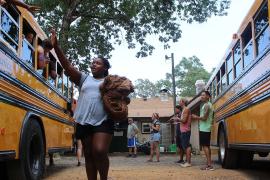During the summer, I have many opportunities to see and discuss camper behavior at the several camps I visit during the season. It never ceases to amaze me how quickly even some well-educated, experienced adult leaders resort to tactics that involve shaming children or threatening to take things away from them as methods of managing their behavior. I believe children sometimes need firm guidance. I also believe that guidance can be offered respectfully, without shame or threats. I offer two examples from this past summer.
“Marcus” is a twelve-year-old boy at an urban day camp. He is physically small for his age and many adults think he is at least two years younger than he really is. I mention this because Marcus often tries to “prove” himself by being provocative with other campers. He can get silly, call kids names, and generally “bait” other campers by teasing or goading them.
Marcus also has a severe astigmatism that inhibits his hand-eye coordination, making it even more difficult for him to connect with other boys his age through sports. It was not uncommon for counselors to catch Marcus calling another camper “stupid” or teasing another camper to a point where they would lash out at him.
Typically the staff would simply yell at Marcus to stop or take him by the arm and pull him aside, scolding him and telling him what not to do. It was clear that this response was becoming automatic for the staff. Marcus was soon identified as a troublemaker. Whenever a counselor would reprimand Marcus, he would respond by saying, “Now what have I done?” Not only was the counselors’ response to Marcus’s behavior not working, it was causing him to become increasingly resentful of the staff — and them of him.
I took a wholly different approach. I instructed the unit director and one of the more charismatic counselors to take Marcus aside and speak with him as soon as he arrived at camp the next morning. The idea is to establish a connection with Marcus when he is not in trouble, thereby increasing the likelihood that he will be receptive. The very first part of this meeting is positive: “Marcus, we really enjoy having you at camp! You can be very funny and have a great time here.” Opening the conversation with Marcus this way follows my prescription for speaking with children that I call “Charity, Clarity, Brevity, Levity.” Being positive makes it harder for a camper to tune you out. It sets the stage for a more effective and trusting interaction. It signals the child that you are not out to shame or humiliate him, but rather to help him be successful. I tell the staff to keep it short, crisp, and to the point (the “brevity” piece).
After mentioning a few positive traits, I instructed the staff to describe to the camper in plain language what they have observed. “That said, Marcus, we all know you sometimes get silly or tease kids or do things to make kids not want to be around you. I don’t think you like it when you get into trouble or when other kids push you away. We want to help you with that so you have more fun, kids like you better, and you get into less trouble. We know you’re a great kid! We just want to help you be a great kid more of the time!”
After this opening part of the conversation, I had the staff describe what would happen the next time they saw Marcus getting silly or saying something mean or teasing another camper. The scheme was very simple: A counselor would put two hands on Marcus’s shoulders, lean down close to him, and say quietly, “Marcus, you can either fix it yourself now; or you can stay with me for a while. Which one do you want to do?” Marcus would then choose to “fix it,” meaning control himself and calm down, or he would have to stay next to a staff member for an unspecified amount of time. Marcus was then told that all the counselors would be informed of the scheme and any one of them could come to him with this choice.
The first time the opportunity presented itself, a counselor did exactly what had been prescribed. He calmly approached Marcus from behind, took him aside a little, leaned down to speak privately and quietly to him, and offered him “the choice.” He immediately said he would “fix it.” The phrase “fix it” became short hand for “control yourself.” At the end of the day before Marcus left camp, all the counselors that had approached Marcus with his “choice” met briefly with him and the director to praise him for how quickly he had responded. In this way, Marcus was given credit for his success, which further improved his status with the staff and their status with him. As the week wore on, all a counselor had to do with Marcus was meet his gaze and mouth the words, “fix it,” and he would self-correct his behavior.
The second example involves an eightyear- old girl at a coed overnight camp. “Erika” has a little bit of a temper problem. She is an internally distracted little girl, meaning that she often daydreams and doesn’t pay attention when counselors are giving out instructions. Erika gets especially upset when she is making a transition, like at the end of cleanup or rest hour when she is getting ready to leave her cabin and go to an activity. Because she is slow and often falls behind the other campers, she sometimes gets flustered, cries and whines, and can even get defiant when she feels “rushed.”
Because Erika is easily distracted and probably “processes” instructions slower than some of her peers, I made it clear to her counselors that communicating with her needed careful attention. I compared speaking to Erika to talking on a cell phone. “You’ve got to have a signal before you place the call,” was how I put it. With Erika, getting a “signal” means getting into her “reception space”: (1) use her name when speaking to her; (2) speak slowly; (3) use a hand on her shoulder to enhance the “connection”; (4) state what you want in only a few words; (5) ask her to repeat back what you want her to do. If Erika is caught by a sudden instruction or directive from a counselor, she gets rattled, and you then have a “dropped call.”
In addition, I pointed out that counselors would have to take turns “shadowing” Erika about five minutes before an anticipated transition was announced to the other campers. Having a counselor spend some one-on-one time with her heading into a transition would help Erika get through the transition with less stress and drama. It would also help Erika respond more positively to staff, which in turn would allow staff to feel more successful with her. There is nothing that destroys morale among staff more than feeling unsuccessful with a camper who exhibits disruptive behavior.
Interestingly enough, as the careful approach to communicating with Erika began to work, counselors added a sticker book to the mix on their own, rewarding Erika with a new sticker that she put into her scrapbook when she successfully navigated a transition. Once Erika “earned” enough stickers, she got to visit the baby deer in the camp animal farm and feed it. The other girls soon began to engage with Erika because she was calmer and less unpredictable to them — the counselors’ combined efforts had a ripple effect. As I said to Erika’s counselors, children will respond positively to the efforts the staff makes with another camper because they see how respectful and encouraging staff members are, which always increases the positive regard the other campers have for them!
Bob Ditter is a licensed clinical social worker specializing in child, adolescent, and family therapy.


